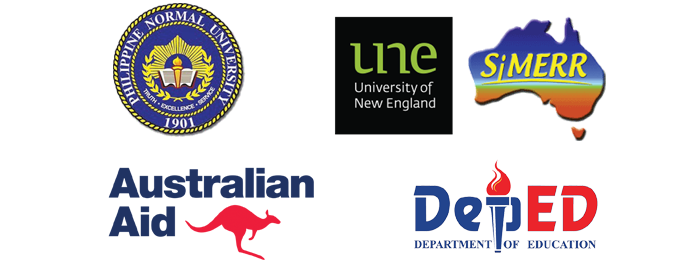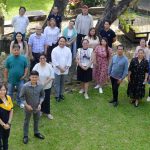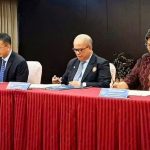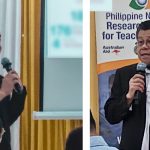RCTQ co-director talks about ‘new normal’ at PNU’s virtual send-off for 2020 graduates
What does the ‘new normal’ mean for the Philippines’ pre-service teacher education graduates?
While the term is currently more associated with new norms in human mobility and in conducting work as triggered by the COVID-19 pandemic, Professor John Pegg—Director of the University of New England Australia-SiMERR National Research Center and co-director of RCTQ—said that today’s new teachers are also bound for the ‘new normal’ in education with or without the pandemic situation.
Dr. Pegg inspired more than 100 baccalaureate graduates of the Philippine Normal University (PNU) as guest speaker at their virtual send-off ceremony on 18 June 2020.
“Regardless of the presence of COVID-19 or not, you were already about to enter working in a new normal in education in the Philippines. Huge reforms in the Philippine education system have occurred since 2013 with the start of the K to 12 reform,” said Dr. Pegg. “Schools are different places now from the ones you left as a student. More students attend elementary school than ever before. Students now leave secondary school two-years older than when you were a student”
Dr. Pegg, who was introduced by PNU President Dr. Bert Tuga, said that when graduates start teaching, they will work with a framework of new expectations that expect them to grow as quality teachers through developmental career stages as described in the Philippine Professional Standards for Teachers (PPST).
“The development of these professional standards took over three years of research by RCTQ and was accepted by DepEd for national implementation in 2017. Now, for all teachers in the Philippines, for all Tertiary Education Institutions, and for all providers of teacher professional development, these professional standards are the ‘new normal’ to be followed,” said the Australian academic. “Similarly, professional standards for school leaders is about to be announced for national adoption by DepEd. This will bring in a new normal for school heads and supervisors. Again this work has been championed by RCTQ.”
Dr. Pegg added: “These new normals (in education) are nothing to fear or be anxious about. They are not about reinventing education and looking for new fads (untested ideas) or throwing away proven practices of the past where evidence shows that they work. These new normals are guided by evidence and deep research with a focus on quality.”
As graduates faced the ‘new normal’ both in their professional practice and in their day-to-day lives, Dr. Pegg shared three points that they could carry with them for life:
- Have high expectations of yourselves, your colleagues and your students
“Your journey to be the best quality teacher you can be is similar to students trying to be the best learners they can be. The brain works the same way for you and students, even though the area of focus is different. Expectations need to develop further as you gain experience in the profession and strive to become even better through an ongoing commitment to the delivery of quality teaching and learning.”
- It takes time for the brain to acquire and use quality skills, knowledge and understandings
“The learning brain requires experience and effort through deliberate practice, persistence, determination and resilience when the going is tough. It can involve a willingness to push yourself and your students in challenging work. Helping students to attain, over time, clear and deep subject knowledge in their thinking is a significant gift. For this to work it needs to occur lesson-by-lesson, day-by-day, week-by-week, month-by-month.”
- Valuing Errors as a critical part of all learning
“Errors play a critical role in the establishment and maintenance of building expertise. The brain is especially organised to respond to mistakes in a ‘positive’ way in terms of learning outcomes. Learning should be about acknowledging the critical importance of focusing on mistakes or errors. Otherwise we are setting them up for future failure as well as placing a ceiling on their learning.”
Success, he said, should not be measured by the number of times a learner has avoided mistakes, but rather on the complexity and mastery of important ideas.
With support from the Australian Government, Dr. Pegg became instrumental in building the partnership between UNE and PNU that led to the establishment of RCTQ. In 2015, he received the degree of Doctor of Education (honoris causa) from PNU for his contribution to education reforms in the Philippines and internationally.
Heard by graduates and their parents from their homes via the Zoom app, Dr. Pegg’s talk was streamed live worldwide via the PNU Facebook.
https://www.rctq.ph/?p=1566FeatureCOVID-19,Philippine Normal University,PPST,SiMERR National Research Centre,University of New England






